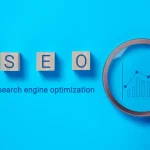With increasingly complex algorithms and frequent changes to search engine guidelines, mastering SEO requires technical knowledge, creativity and experience. This is where SEO agencies come into their own:
- Technical specialisation: Agencies bring together experienced professionals in on-page, off-page and technical optimisation.
- Monitoring trends: They are always up to date with the latest changes in the sector, ensuring that their clients are not harmed by changes in algorithms.
- Measurable results: A good agency offers clear and transparent reports on the impact of the strategies applied.
Now let's break down what a SEO agency and how it differs from other digital marketing agencies.
What is an SEO Agency?

Definition and Purpose
An SEO agency is a company that specialises in helping websites rank better in organic search engine results. Its main objective is to increase the client's online visibility, attract qualified traffic and ultimately generate conversions and revenue.
Unlike a generalist digital marketing agency, which can offer services such as paid ads and social media management, an SEO agency focuses exclusively on the techniques and strategies that drive organic traffic, optimising both the technical aspects and the content of the site.
The Difference Between SEO Agencies and Other Digital Marketing Agencies
Although many digital marketing agencies offer SEO as part of their portfolio, an agency dedicated to SEO stands out for:
- Exclusive focus: It focuses only on organic strategies and practices that improve performance on search engines.
- Technical specialisation: It has experienced professionals in areas such as algorithm analysis and technical SEO, link building and optimised content production.
- Long-term approach: Unlike paid adverts, SEO seeks sustainable and long-lasting results, with benefits that remain even after specific campaigns have ended.
Benefits of Hiring a Specialised Agency
Working with an SEO agency has several advantages for companies looking to stand out in the digital environment:
- Saving time and resources: The agency takes on the complex SEO tasks, allowing your in-house team to focus on other priorities.
- Access to advanced tools: Platforms such as Ahrefs, SEMrush and Screaming Frog are often used by agencies for detailed diagnostics.
- Proven expertise: SEO agencies have experience in different niches and know which strategies work best for each sector.
- Detailed reports: They provide regular analyses of campaign progress, helping to justify ROI and adjust strategies when necessary.
Now that you know what an SEO agency is and its main benefits, in the next topic we'll explore the essential services offered by these agencies.
Main Services Offered by an SEO Agency

SEO audit
The audit is the starting point for any SEO strategy. It is a detailed process that analyses all aspects of the site to identify problems, opportunities for improvement and strengths that can be exploited.
Technical Site Analysis
- Charging speed: Identifying problems that slow down the site and affect the user experience.
- Tracking and indexing: Checking for technical errors that prevent search engines from accessing or understanding the content.
- Responsiveness: Evaluation of how the site behaves on mobile devices.
Content Evaluation
- Quality and relevance: Analysing the alignment of the content with the target audience's search intentions.
- Keyword optimisation: Identification of gaps or excess terms that could jeopardise performance.
Backlinks review
- Analysing existing links: Identifying toxic backlinks that can harm ranking.
- Mapping opportunities: Discovering areas where high-quality links can be purchased.
Keyword Research
A good SEO agency carries out in-depth research to identify the most relevant terms to attract qualified traffic.
Identification of Relevant Terms
- Focus on keywords that align search intent and traffic volume.
Competitor Analysis
- Identifying terms that your competitors are using successfully.
Selection of Strategic Keywords
- Balance between words with a high commercial intent and informative terms for all stages of the sales funnel.
On-Page Optimisation
On-page optimisation is the process of adjusting elements within the site to make it more relevant and accessible to search engines.
Titles and Meta Descriptions
- Creating attractive texts that include relevant keywords.
Structuring Friendly URLs
- Ensuring clear and descriptive URLs, making it easier for search engines and users to understand.
Content and Images
- Adjusting texts and visual elements to improve user experience and SEO relevance.
Off-Page Optimisation
Off-page SEO focuses on actions outside the site that help increase its authority and relevance.
Link Building
- Acquiring high-quality backlinks from trusted sites.
External Content Marketing
- Production of articles, case studies and infographics for publication on partner sites.
Online Reputation Management
- Monitoring and improving brand perception on external platforms.
Technical SEO
Technical SEO deals with the structural and performance aspects of the site, ensuring that it meets the standards required by search engines.
Charging speed
- Implementation of improvements to reduce loading times.
Mobile-First
- Ensuring that the site is optimised for mobile devices, in accordance with Google's mobile-first index.
Structured Data
- Implementation of Schema Markup to improve the display of the site in SERPs, such as rich snippets and highlighted results.
Content Creation and Optimisation
Producing relevant and optimised content is one of the keys to attracting and engaging audiences.
Blog and article development
- Creating content that answers the target audience's questions and attracts qualified traffic.
Infographics and Video Production
- Visual materials that complement the text and increase the time spent on the site.
Updating Existing Content
- Reviewing old posts to improve relevance and ranking.
Monitoring and Reporting
Continuous monitoring of the site's performance is essential for adjusting strategies and ensuring success.
Monitoring metrics and KPIs
- Traffic monitoring, keyword ranking and conversion rates.
Periodic Performance Reports
- Clear reports showing the results obtained and the adjustments required.
Strategic Adjustments Based on Data
- Continuous changes based on campaign performance.
Now that we know the services offered by an SEO agency, let's explore in the next topic how the working process of these agencies works.
The work process of an SEO agency

Understanding the Business
Before embarking on any strategy, the agency needs to thoroughly understand the client's business, its market and its specific needs.
Initial Meetings and Briefings
- Objective: Collect detailed information on the business model, target audience and marketing objectives.
- Initial analysis: Identifying the customer's main pains and opportunities.
Defining Objectives and Goals
- Establishment of KPIs (Key Performance Indicators): Define measurable metrics, such as an increase in traffic, leads or sales.
- Prioritisation: Identify the actions with the greatest impact and align expectations.
Strategic Planning
Based on the initial diagnosis, the agency develops a personalised action plan tailored to the client's needs.
Development of a Personalised Plan
- Competitive analysis: Evaluation of direct competitors in the digital market.
- Mapping opportunities: Identifying relevant keywords and topics to explore.
Alignment with Other Marketing Strategies
- Integration of SEO with paid media campaigns, social networks and content marketing to maximise results.
Implementation
Once planned, it's time to put the strategies into practice.
Execution of Planned Optimisations
- Technical adjustments, content improvements and implementation of off-page SEO practices.
Collaboration with Internal Teams
- Synergy: Working together with the client's IT team, marketing and other departments to ensure alignment and agility.
Continuous Monitoring
SEO is a dynamic strategy that requires constant monitoring to identify what is working and correct any problems.
Use of Analytical Tools
- Platforms such as Google Analytics, Search Console, SEMrush and Ahrefs are used to measure results and identify trends.
Identifying Opportunities and Threats
- Detection of changes in public behaviour, competition or search engine guidelines.
Reports and Feedback
Transparency is essential for a successful partnership. Clear reports help the agency and the client stay aligned.
Presentation of Results
- Detailed metrics: Traffic, keywords ranked, backlinks acquired and conversions.
Discussion of Next Steps
- Review of ongoing strategies and planning of next actions based on the results obtained.
Now that we understand how an SEO agency works, the next topic will cover how to choose the ideal agency to meet the specific needs of your business.
How to Choose the Right SEO Agency

Portfolio evaluation and success stories
A good SEO agency will have a solid portfolio that demonstrates its experience and results obtained with previous clients.
What to look for in a portfolio
- Proven results: Increased organic traffic, keyword ranking and improved conversion.
- Diversity of sectors: Experience in different niches can indicate an ability to adapt to different markets.
Analysing Success Stories
- Check the complexity of the projects carried out and the strategic approach adopted by the agency.
- Prioritise agencies that present clear and well-documented results.
Checking Customer Testimonials and Reviews
Feedback from other clients can provide valuable insights into the professionalism and effectiveness of the agency.
Where to look for testimonials
- Agency website: Testimonials" or "customers" section.
- External platforms: Google My Business, social networks and review sites such as Reclame Aqui.
Questions for previous clients
- How was communication during the project?
- Did the agency deliver the promised results?
- Was there transparency in the processes?
Transparency in the Methods and Practices Used
A reliable SEO agency clearly explains the strategies it intends to apply and avoids practices not recommended by search engines.
Questions to ask the Agency
- Do you follow Google's guidelines (white hat SEO)?
- What will the link building process be like?
- What will be the method of measuring and presenting results?
Warning signs
- Promises of quick results or guarantees of specific positions in search engines.
- Reluctance to share details of the strategies used.
Alignment with Company Values and Culture
Choosing an agency that understands the vision and objectives of your business is crucial to the success of the partnership.
Compatibility Factors
- Communication: Is the agency proactive and clear when explaining processes and results?
- Flexibility: Are you willing to adapt strategies to meet your specific needs?
How to Test the Alignment
- Ask for a detailed proposal and analyse whether it is in line with your objectives.
- Hold initial meetings to assess the agency's empathy and understanding of your business.
Now that you know how to choose the ideal agency, in the next topic we'll look at the costs involved and how to evaluate the return on investment (ROI) in SEO services.
Costs and Return on Investment (ROI)

Structuring Prices and Service Packages
SEO costs vary according to the scope of the work, the experience of the agency and the level of customisation of the strategy.
Common pricing models
- Fixed monthly fees: A recurring amount to cover ongoing services such as monitoring, reporting and strategic adjustments.
- Project-based payments: Ideal for one-off optimisations, such as audits or content creation.
- Pay for performance: Cost linked to specific results, such as improvements in ranking or an increase in traffic.
Factors that Influence Costs
- Site size: Larger sites require more time and resources for optimisation.
- Level of competitiveness in the sector: Highly competitive niches require greater investment in link building and content.
- Complexity of work: Technical services, such as the implementation of structured data, can increase costs.
Realistic expectations of results
SEO is a medium to long-term strategy. Although initial results may start to appear in a few months, the most significant benefits are usually realised between 6 and 12 months.
Factors that influence deadlines
- Current status of the site: Well-structured sites can achieve improvements more quickly.
- Frequency of adjustments: Consistency in applying optimisations is essential to speed up results.
Analysing ROI in SEO Campaigns
Measuring the ROI of an SEO strategy is essential to assessing whether the investment is bringing financial and strategic returns.
How to calculate ROI
- Basic formula:
ROI (%) = [(Revenue Generated - Investment) / Investment] x 100 - Practical example: If you invested R$ 10,000 in SEO and generated R$ 30,000 in sales attributed to organic traffic, the ROI is 200%.
Important metrics for evaluation
- Increase in organic traffic: More visits can indicate greater brand visibility and reach.
- Conversions: The number of leads or sales generated from organic visits.
- Decrease in cost per acquisition (CPA): Reducing the cost of attracting new customers is a sign of efficiency.
Long-term benefits
SEO can offer one of the best returns on investment in digital marketing. Unlike paid adverts, SEO results continue to generate benefits even after the initial implementation has ended.
Now that we've covered costs and ROI, in the next topic we'll explore the current and future trends that will shape SEO in the coming years.
Current and Future Trends in SEO

Impact of Artificial Intelligence and Machine Learning
Artificial intelligence (AI) and machine learning are revolutionising SEO, allowing search engines to better understand the intent behind searches and offer more accurate results.
How AI is shaping SEO
- RankBrain and BERT: These Google algorithms help interpret complex searches and natural language, prioritising relevant and well-structured content.
- Predictive analyses: AI-based tools help identify trends and future public behaviour.
Opportunities for companies
- Creating content that responds directly to the user's intentions.
- Use of AI tools to optimise keywords, generate insights and improve SEO strategy.
Growth of Voice Search and Mobile Devices
With the increased use of virtual assistants such as Alexa, Siri and Google Assistant, voice search is transforming the way people search.
Strategies to Optimise for Voice Search
- Conversational keywords: Incorporate more natural, question-based terms.
- Local SEO: Many voice searches include geographical intent, such as "restaurants near me".
Importance of the Mobile Experience
- Mobile-first indexing: Google prioritises sites optimised for mobile devices in its main index.
- Responsive experience: Sites that offer fluid navigation on mobile devices are favoured in the rankings.
Focus on User Experience (UX)
User experience has become a crucial factor for SEO, especially with the introduction of Core Web Vitals as a ranking criterion.
Core Web Vitals metrics
- Largest Contentful Paint (LCP): Measures the loading speed of the main content.
- First Input Delay (FID): Evaluates the response time to the user's first interaction.
- Cumulative Layout Shift (CLS): Checks visual stability during page loading.
How to Improve UX
- Ensuring fast, stable and responsive pages.
- Create intuitive designs that guide the user to the desired action.
Video Content and New Formats
With the growth of video platforms such as YouTube and TikTok, visual content is becoming an essential component of SEO.
Benefits of Video Content
- It increases the time spent on the site, a positive sign for Google.
- It makes it easy to explain complex topics in a visual and engaging way.
Optimisation Strategies for Videos
- Include keywords in titles, descriptions and tags.
- Add transcripts to facilitate indexing by search engines.
Semantic Search and User Intent
Search engines are increasingly focused on understanding the context and intent behind searches, not just the keywords.
Necessary adaptations
- Cluster of topics: Create interconnected content that goes deeper into the topics covered.
- Related keywords: Expand the content with semantic terms that cover different nuances of a topic.
Digital Sustainability and Green SEO
Concern about digital sustainability is gaining ground in SEO.
Benefits of Sustainable Practices
- Reducing the environmental impact of the site, such as by optimising images and reducing unnecessary scripts.
- Improve the user experience while adopting environmentally conscious practices.
With these trends shaping the future of SEO, companies that adapt quickly will have a significant competitive advantage. In the next topic, we'll consolidate everything we've learnt in this guide with a detailed conclusion.
Conclusion
Recap of the Importance of SEO
SEO is one of the most important strategies in modern digital marketing, offering a way to attract qualified traffic, increase visibility and generate conversions in a sustainable way. With the constant evolution of search engine algorithms, understanding how an SEO agency works and what it can offer is crucial for companies wishing to grow online.
- SEO done right: It goes beyond ranking keywords, encompassing improvements in the user experience and alignment with search intentions.
- Strategic partnership: Working with an SEO agency provides technical expertise, access to advanced tools and a holistic view of digital opportunities and challenges.
Benefits of Working with a Specialised Agency
- Personalised optimisation: Strategies adapted to the company's sector and specific objectives.
- Measurable results: Ongoing reports showing the impact of the actions taken.
- Monitoring trends: Guarantee that your company is aligned with the best market practices.
Final considerations
If you want to strengthen your digital presence and take advantage of all the opportunities offered by search engines, relying on an SEO agency is the right step. Choose a reliable partner, evaluate real results and work with experts who understand your business challenges.
Throughout this guide, we've detailed how an SEO agency works, the services it offers and the benefits it can bring to your company. Now it's time to put this knowledge into practice and start turning your organic traffic into a growth engine. Get in touch with our team of experts to get your quote.????





